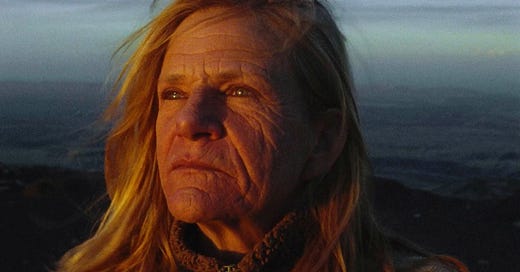A Love Song
The great Dale Dickey, who's made a career playing hard-edged, dangerous women, finally gets a chance to shine in a romance -- albeit a bittersweet one about regret and loss.
The character actor Jonathan Banks, best known for playing Mike Ehrmantraut on “Breaking Bad” and “Better Call Saul,” has talked about how being born with his pug-like face destined him to play tough guys and cops. No one was about to pick him as the leading man in a romance… but he’s done alright.
Better to be typecast than not cast at all.
Dale Dickey, with her fierce, creased lioness face, has enjoyed a similar late-career surge owing to her ability to authentically play hard-edged, dangerous women. She’s been a mainstay in indie films for the last 20 years who occasionally gets supporting parts in bigger movies like “Iron Man 3” or “Hell or High Water.”
In other words, Dickey’s in the top 1% of actresses who want to make it in the movies. Still, that magnificent face of hers also means filmmakers tend to slot her into the same sort of roles. A romance? Heaven forfend. Moviegoers like their romantic heroines to be awkward and 30ish, not well-worn and Social Security age.
So I was excited to learn she’s got a leading role in “A Love Song,” a tender little romantic drama, albeit a bittersweet one about regret and loss.
Dickey plays Faye, a lonely older woman who’s been on her own since her husband, Tommy, passed seven years ago. As we meet her, she’s staying in an aged camper hitched to her old truck next to a lake at the foot of the mountains out West somewhere.
(Never specified, though the movie was shot in Colorado.)
Faye’s existence is a familiar routine that she attacks resolutely, if without zeal. She wakes up, wanders down to the lake to pull up the crayfish traps she baited the night before. Throwing back the teeny ones, she boils a couple for her breakast to go with some instant coffee. An old radio plays sad romantic songs, and has an almost magical ability to find just the right one by randomly spinning the tuning dial.
Not much happens at this campsight. That’s exactly why the people come here.
The mail is delivered intermittently by a young fellah who piles it up on the back of his horse. An amiable middle-aged Black female couple is her only neighbors. “Howdy” is the universal greeting, given and received unironically.
A strange troupe of four cowboys and a young girl, their sister, sidle up one day with shovels and, impressively polite, ask Faye if they can dig under her camper. It seems they quietly — and not entirely legally — buried their pops there for the view some years back, but now want to move him because a small, ugly oil derrick has been installed nearby.
Faye demurs on their request until after she leaves. It seems she’s waiting on someone. It becomes clear Faye is hopeful and scared about this prospect. She’s been there awhile and is ready to give up.
However, when the siblings’ truck breaks down, Faye happily loans them her engine — pulls it out herself and reinstalls it with practiced ease. Faye is the sort of woman who picked up a variety of skills from a life built off odd jobs, such as piloting bush planes for the forest service.
Faye has two almanacs in her camper, one for birds and another for constellations — “There’s days and there’s nights, and I got a book for each.” She can identify the song of the whippoorwill and Andromeda in the night sky with ease, along with a lot of other things.
Besides, getting stuck with no way to leave gives her more time to wait. The cowpokes offer up an old canoe as compensation — “for recreation and romantic excursions.”
She’s rewarded soon after by the arrival of Lito, a friend from high school whom she carried a torch for. Faye isn’t even sure what he looks like now, and is obviously anxious that he won’t care for how she looks. But Lito, who comes with a big, friendly dog named Hank and a wide smile, seems to like what he finds just fine.
Lito is played by Wes Studi, another actor consigned to hard roles due to his non-classical looks. Watching these two people, stepping up to the threshold of old age, reconnect and perform a nervous little courting dance is just magical.
They even break out guitars and pick out an antiquated tune to duet. I about fell out of my chair with rapturous delight.
Lito is just as damanged and lonely in his own way as Faye. His own wife, Shirley, died more recently and he hasn’t quiet let all the way go.
Dickey and Studi give master classes in the subtler arts of film acting. Long wordless stretches seem alive with emotions and portent. I don’t think their characters exchange more than a couple pages of dialogue throughout the entire movie, and yet these unspoken passages seem filled with a depth of meaning.
“A Love Song,” written and directed by Max Walker-Silverman in his feature film debut, is a simple story about simple people seeking the answer to a simple question: When is it too late for love?
We’d like to think the answer is “never.” When you get old enough you learn that you may not say never, but it is something you experience.
Faye has reached a point in life where there isn’t a lot to hope for — but she’s willing to reach out and grab at what she can. And that makes her extraordinarily brave and beautiful.





